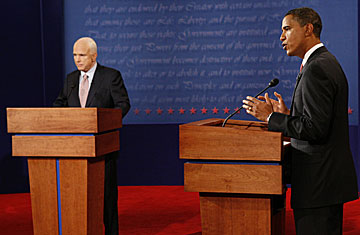
Barack Obama and John McCain during their debate at the University of Mississippi in Oxford, Mississippi.
Toward the very end of tonight's debate—which was quite a good one, I believe—John McCain laid out his rationale in this election in just a few words: Senator Obama, he said, lacks the "knowledge and experience to be President." The presidency will turn on whether the American people agree with McCain on that—but on this night, Obama emerged as a candidate who was at least as knowledgeable, judicious and unflappable as McCain on foreign policy ... and more knowledgeable, and better suited to deal with the economic crisis and domestic problems the country faces.
But even if my verdict were reversed to grant McCain a slight victory, there was nothing in this debate that was a knockout blow—nothing that should change the current trajectory of the campaign. (Although it may staunch the slow bleed that McCain has experienced the past week). Obama seemed plenty presidential; McCain seemed more prudent and thoughtful than he has since he uttered the most important line of the campaign so far, "the fundamentals of the economy are good." Neither man closed the sale, and I don't think many votes, or opinions, were changed.
This was a debate—at times explicitly—about tactics and strategies. McCain was more tactical, trying to pick fights with Obama on the details of foreign policy and not venturing beyond his personal domestic policy obsessions like the $18 billion spent per year on Congressional earmarks. Obama was more concerned with strategy, and an overall vision for the country—he was the one who brought up the damage done to America's standing in the world, and also the one who insisted on putting the war in Iraq in a broader strategic context: it had hurt America's overall position in the middle east by empowering Iran and allowing Al Qaeda to regain strength in Afghanistan. As for McCain's remark about Obama not knowing the difference between a tactic and a strategy—McCain was wrong. The counterinsurgency methods introduced by David Petraeus in Iraq were a tactical change, a new means to achieve Bush's same strategic end of a stable, unified Iraq. If Bush had decided to partition the country, or to withdraw, that would have been a change in strategy.
McCain was clearly the aggressor in this debate and that may have worked to his advantage—Obama graciously admitted when he agreed with McCain; McCain rarely acknowledged Obama in that or any other way. The problem with McCain's aggressiveness was that it almost always involved misstating Obama's positions—on offshore drilling, nuclear power, talking to our enemies, raising taxes on the middle class, attacking Pakistan ... the same list of untruths McCain has stuck with throughout the campaign. Or he'd try to make petty distinctions, like whether Obama's initial statements on Georgia were tough enough. When Obama chose to criticize McCain it was on big things—supporting the war in Iraq, opposing alternative energy, standing by the Republican trickle-down philosophy of taxation. In this way, too, Obama was strategic and McCain tactical.
McCain was also confused about what "preconditions" means in diplo-speak. The Bush Administration had, until recently, set a precondition for talks with Iran: that the Iranians had to stop processing nuclear fuel. Obama would talk to the Iranians—as Henry Kissinger and James Baker would—without setting that condition. (Diplo-speak only vaguely resembles English: precondition is redundant, all conditions for starting a negotiation are pre-.) Unfortunately, we never learned how McCain feels about that condition because Obama dropped the ball here—he never explained what he meant by "preconditions" in this specific context or asked McCain if he agreed. There were several other opportunities missed by Obama: he could have noted that the Iraqi government has agreed to his notion of a timetable and asked McCain, Do you want to stay longer than the Iraqis want us there?
Ultimately, sadly, these debates are won, or lost, on style and perceptions of character—not substance. Those are matters of taste. We'll see if McCain seemed too old or Obama too young. Obama did speak in a stronger, firmer voice. He was clear, straightforward and not at all professorial. He looked directly into the camera; McCain rarely, if ever, did. But McCain put his experience—his frequent travels overseas—to good use in this debate, although his standard laugh lines like "Miss Congeniality" seemed to bomb.
Obama did everything he had to do, with few if any mistakes. I thought McCain did less so. The early snap polling seems to agree with me, but I'd caution against taking those too seriously. This was a big event in this campaign—the beginning of the end. It will need to be digested, discussed around the water cooler and the dinner table. But the race has not been decided yet.
